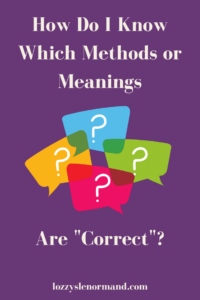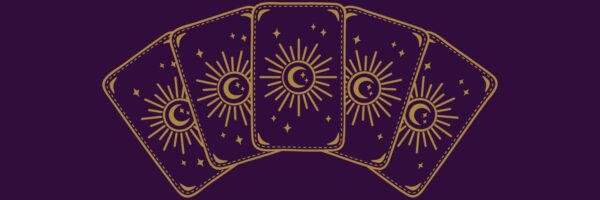 As there’s so much out there about Lenormand now, books, websites, approaches, even rivalries, many readers new to Lenormand cards get anxious both about whether they’re doing things “right” (in the sense of having confidence because they’re new to the cards) or learning the “right way” or not. This issue has several aspects. I’ve tried to cover a few of them previously here. For instance, through questions like:
As there’s so much out there about Lenormand now, books, websites, approaches, even rivalries, many readers new to Lenormand cards get anxious both about whether they’re doing things “right” (in the sense of having confidence because they’re new to the cards) or learning the “right way” or not. This issue has several aspects. I’ve tried to cover a few of them previously here. For instance, through questions like:
- Which of the meanings shall I choose for my situation and how do I know which one is right?
- What about contentious cards like the Lily and the Whip?
- What about different “schools” of thought?
- Should I use ‘traditional’ or ‘modern’ methods and which is best?
- Should I use extra cards or not?
There’s a whole heap of issues to explore here when trying to get to the bottom of that main question. Let’s dig in a bit.
What Do You Mean By “Correct”?
This is really what’s at the heart of the matter. What is it you’re looking for here? Is it:
- The most original and historically ‘pure’ meanings and way of reading the cards?
- The ones that tell my future most accurately?
- The ones that are the most useful to me personally?
Let’s take a look.
1. I Want The Most Historically ‘Pure’ Meanings And Methods
Lenormand is not some kind of religion. There ARE of course spiritual “traditions” with all kinds of fortune telling methods and oracle cards, often from being handed down generations and across countries and through cultures, Romani Gypsies being the most obvious. Since that is not my personal background, I wouldn’t presume to offer you anything like that here, but there are certainly other readers who can and do.
If, however, you mean the ‘most historically accurate’ meanings of the Petit Lenormand cards, you come across another problem. As mentioned previously, these particular Le Petit Lenormand cards are based on a parlour game, the Game of Hope, devised in Germany in 1799, which had very little to do with the famed French fortune teller Mlle Lenormand herself.
At the time, they came with little instruction as to individual meanings, especially as related to fortune telling. When they were rebranded later, they came with instructions from a supposed descendant of Mlle Lenormand, although, be aware, this was likely more of a marketing ploy than anything. You can see the basic meanings (known as the Philippe Lenormand meanings) and the Near & Far method here. Despite the fact this likely didn’t have much to do with Mlle Lenormand so isn’t necessarily as “authentic” as it purports to be, at the same time, it is unlikely these meanings or this method was conjured up out of nowhere. On top of that, there is also the issue of variance in regional traditions and local, historical, and cultural customs, particularly with regard to meanings.
Also there is the issue of what the precursors to the Game of Hope cards were. The most direct ones could well have been something called Viennese Coffee Cards that were popular in 18th century coffee houses. These in turn, as the name suggests, are likely to be based on the meanings and interpretations from tasseomancy (the traditional reading of e.g. coffee grounds, tea leaves etc). But then, it’s also likely that the meanings of those cards were part of a much wider general oracle tradition. There were a whole swathe of ’emblem’ cards popular at the time, many of which have similar everyday symbols among them. Who is to say which is the most ‘original’ or the most ‘correct’?
As I say, there are far more scholarly “teachers” of the Lenormand system than myself, many of whom I am aware sneer at the supposed impurity of reading the cards with intuition, for example, or not following one or other of the “schools” rigidly. I do broadly follow ‘the rules’ as there do seem to be many similarities across traditions, but at the same time, as with any storytelling, a great deal of intuition needs to be employed (and coffee ground reading, for example, certainly would have utilised that skill.)
I should point out also that I do not claim to be a Lenormand or even a cartomancy scholar, but I am a reader, and I know what works for me. So don’t take my word as definitive; read around, experiment, find what works for you and matches YOUR sensibilities and get more scholarly and in depth elsewhere if you wish. Just be aware that that’s not my aim here. After all, it’s card reading we’re talking about, something based on a parlour game devised for entertainment utilising the very human wish to understand patterns and know the future. It’s not brain surgery or nuclear fusion.
And just a note: it may just be a personal foible, but I really do despise the idea that only special very learned people are ‘permitted’ to have ‘true’ knowledge and they are to act as the holders of knowledge above everyone else. It reeks of the same old religious purity and elitism to me. That’s not what I’m about here, and the purpose is to share info on what is essentially a system of symbols relating to ordinary people’s everyday lives in a pragmatic, practical way that’s easy to follow.
2. I Want The Ones That Tell My Future Most Accurately
This is probably what most people really mean by “getting it right.”
The thing is, although I can share my methods and give my point of view of things and experiences, I can’t actually show you which method is definitely going to “tell your future” most accurately. The only person who can test out whether it does or not in your own life and practice is you. You can find some tips and ideas here:
10 Ways To Improve The Accuracy of Your Readings
But to be honest, experimenting and trying it out really is the only way to find out. Play around, experiment, keep practicing, keep a Lenormand journal, and keeping checking back, seeing how you did and adjusting things as necessary. I talk about how you can use what you learn to inform your future practice here:
5 Things To Learn From Looking Back On Your Readings
A crucial point to make, though, is that Lenormand (or any card reading system really) isn’t ALL about fortune telling and prediction; and it doesn’t have to be. And of course, there is a huge assumption if that’s your take that our futures are somehow already set out in stone. It may surprise you to know from a card reader, but that’s not actually what I believe at all.
It’s noticeable how we most often look for future readings when we are feeling out of control in our lives or perhaps unconfident about our own abilities. For example, I find that readings or reading requests in the most emotive situations—Love and Romance mainly— tend to be the ones most focused on the future and prediction. It’s because we feel emotionally out of control, it’s about the fundamental human need for love, we are vulnerable, and so the risks feel enormous. Will it happen or won’t it? Does he or she like me or not? Now, the cards may well reflect energies and influences, but it’s worth bearing in mind that the only person actually creating your future is you. I covered some of the issues around that in my The Future Fate & Free Will in Lenormand Readings.
My own view is that pure fortune telling/prediction is not the only way to use the cards, and not necessarily the most useful. I know! Shock! Horror!
3. I Want The Ones Most Useful To Me Personally
To me, this is ultimately what it should all be about. If a method’s not useful to you in your life, don’t use it.
I would also say it’s worth really digging a bit deeper here, and thinking about what you actually want from Lenormand cards (or from systems like them) and why.
What would be useful to you? What are you really looking for at heart? For example:
- Proof that there is “something else out there” and some kind of order and sense of connectivity to the universe. Spiritual comfort.
- To be able to know exactly what will happen in the future because a particular situation feels out of control.
- To be able to know exactly what will happen in the future because you don’t feel confident in your own abilities to take action and create the future yourself.
- To be able to know exactly what will happen in the future because you have a big scary decision to make.
- To explore possibilities and unconscious influences that may be impacting your life
- To access ways of looking at and exploring certain situations differently
- To get some food for thought and consider your unconscious reactions to certain possibilities
- To find ways of helping you resolve your own problems
- To consider your life and problems and where they might fit in the “grand scheme of things” in the spiritual or philosophical.
I covered getting more to the bottom of these issues here, in How To Get To The Root of A Lenormand Reading
So I think the real question to ask yourself here if you find yourself worrying about whether or not you’re “doing it right” is as follows.
Why am I doing this and what do I actually want from the cards?
On that note, I want to make sure I (and the blog!) continues being useful here, so why not tell me about you and YOUR experiences with the cards? Are there questions you still have about them? What Lenormand topics or areas do you have difficulty with that you would like me to cover here? You can let me know here!
Do You Need More Guidance?
Go to my Lenormand Tips page for more tips about common issues and problems.
For a FREE card combinations PDF E-Book, sign up to my mailing list for weekly newsletters and other freebies (be sure to check ALL your mailboxes to pick it up! And mark me as a safe sender if you don’t want to miss out on stuff.) If you don’t want to sign up, it’s also available in both paperback and ebook format from Amazon as well as other ebook platforms.
Also, my Complete Guide to Lenormand paperback is now available from Amazon! You can also get it in ebook format from Amazon, Kobo, Barnes & Noble, Apple Books & other ebook platforms and all my ebooks are also available as downloadable/printable PDFs here in the SHOP!

